تم في شهر ديسمبر عام 2013 توقيع عقد (المرحلة الثالثة) من برنامج استدامة اسطول طائرات التورنيدو السعودية (Tornado Sustainment Programme Phase Three - TSP3) بين شركة BAE Systems والقوات الجوية السعودية بقيمة 1.5 مليار جنيه استرليني (2.5 مليار دولار)
عقد برنامج TSP3 يهدف الى ترقية وتطوير اسطول طائرات التورنيدو الهجومية السعودية وجعلها في مستوى طائرات التورنيدو البريطانية GR4 وذلك بدمج ذخائر Paveway IV بوزن 500 باوند وذات توجيه ثنائي بالليزر \GPS وحاضن تهديف وتصويب متقدم مع اضافة وصلة البيانات Link 16 مع حزمة الاتصالات الشبكية الاخرى
الطائرات السعودية المطورة ضمن معيار TSP الاصلية ليست في مستوى الطائرات البريطانية GR4 ,, وبالتالي فان العمل الجديد ضمن عقد TSP3 ستكون قفزة كبيرة في قدرات الطائرات السعودية
والعقد يتضمن ايضاً تدريب الاطقم الجوية والارضية وتعديل وتطوير المشبهات والاجهزة التدريبية الاخرى اضافة الى تأمين قطع الغيار مع الدعم لفترة زمنية طويلة ,, ومتوقع ان تصل اول طائرتي تورنيدو سعوديتين الى منشآت شركة BAE في وارتن خلال السنة الحالية 2014 ليبدأ العمل على التطوير الجديد لتكون جاهزة للطلعات الجوية الاختبارية خلال السنة القادمة 2015
وقد بدأ تنفيذ برنامج استدامة اسطول طائرات التورنيدو السعودية TSP منذ عام 2005 والتي مكنتها من استخدام مدى واسع من الذخائر الموجهة بما في ذلك الصواريخ الجوالة Storm Shadow ,, وقد تم تنفيذ التطويرات في منشآت شركة BAE Systems بوارتن ثم بعد ذلك تم تثبيت القدرات الجديدة من قبل شركة السلام للطائرات في السعودية ,, اما حزمة الذخائر فقد طلبت من شركة الاسلحة الاوروبية MBDA ومتوقع ان تتم خطوة مماثلة ضمن عقد برنامج TSP3
يمثل عقد TSP3 تأييد قوي لطائرات التورنيدو من قبل القوات الجوية السعودية والتي ستصبح المستخدم الاخير لهذه النوعية من الطائرات اذ ستبقى في الخدمة لعقد آخر حتى عام 2025 بينما قررت بريطانيا لاخراج التورنيدو من خدمة سلاح جوها في 2019 وايطاليا ستخرجها من الخدمة في 2014 واخيراً المانيا في 2024 ,, لكن يوجد اقتراحات بان الدول الاوروبية ستسرع من وتيرة اخراجها من الخدمة وذلك توفيراً للنفقات
وقد اشترت السعودية طائرات التورنيدو ضمن عقد اليمامة 1 في منتصف الثمانينات ثم تبعتها بالدفعة الثانية ضمن عقد اليمامة 2 في اوائل التسعينات وقد بلغ مجموع طائرات التورنيدو الهجومية 96 طائرة لكن بقي في الخدمة منها نحو 80 طائرة
Saudi Tornado upgrade details revealed

A GBP1.5 billion (USD2.5 billion) upgrade and sustainment programme is intended to keep the Royal Saudi Air Force's (RSAF's) Panavia Tornado strike aircraft fleet operational until 2025.
The details of the deal, signed by BAE Systems and the RSAF in December 2013, were revealed to IHS Jane's by defence sources in the Middle East earlier this month.
Known as the Tornado Sustainment Programme Phase Three (TSP3), the work is intended to bring the RSAF Tornado fleet up a configuration similar to the UK Royal Air Force's Tornado GR.4 aircraft. This includes integration of Raytheon Paveway IV duel-mode satellite/laser-guided bombs and advanced targeting pods, as well as the installation of Link 16 datalinks and other network connectivity capabilities.
"The original Saudi TSP aircraft do not have the same level as integration as the RAF GR.4s, so this new work will be a major leap in capability for them," said a source.
The deal also includes air- and ground-crew training, modification and upgrade of simulators and other training devices, spares provision, and long-term logistic support.
The first two RSAF aircraft are expected to arrive at BAE Systems' Warton facility in the UK during 2014 to undergo development work and to begin flight trials during 2015.
Initial work on the Tornado Sustainment Programme began in 2005 with the RSAF fleet being upgraded to allow it to employ a wide range of precision-guided munitions, including the MBDA Storm Shadow cruise missile. Development work took place at Warton and the new capabilities were then installed on the RSAF fleet at Alsalam Aircraft Company's facilities in Saudi Arabia. A package of weapons to go on the aircraft was then ordered from the European weapons company MBDA. A similar process is expected to be followed in the TSP3 project.
The TSP3 contract represents a strong endorsement of the Tornado by the RSAF, which could consequently become the last user of the aircraft if the progamme keeps it in service for another decade. The UK has declared it will withdraw its GR.4s by 2019. The other Tornado users, Germany and Italy, have set their out-of-service dates as 2024 and 2015, respectively, but there have been suggestions that the European nations will accelerate their retirement to save money.
Saudi Arabia first purchased the Tornado in the 1980s as part of the Al-Yamanah project and then ordered a second batch in the early 1990s. Some 96 aircraft were purchased in total and about 80 are believed to be still in service.
BAE Systems has only made a brief mention of the TSP3 during an announcement to the London Stock Exchange on 19 December concerning the United Arab Emirates' decision not to proceed with the purchase of Typhoon aircraft.
"BAE Systems' long-standing relationship with its much valued customer in the Kingdom of Saudi Arabia remains excellent," it said"The [company] has been awarded substantial new business during 2013, including long-term support agreements. Agreements have been concluded in December for the supply of guided weapons and Tornado maintenance and upgrades with a combined value of approximately GBP1.5 billion."
عقد برنامج TSP3 يهدف الى ترقية وتطوير اسطول طائرات التورنيدو الهجومية السعودية وجعلها في مستوى طائرات التورنيدو البريطانية GR4 وذلك بدمج ذخائر Paveway IV بوزن 500 باوند وذات توجيه ثنائي بالليزر \GPS وحاضن تهديف وتصويب متقدم مع اضافة وصلة البيانات Link 16 مع حزمة الاتصالات الشبكية الاخرى
الطائرات السعودية المطورة ضمن معيار TSP الاصلية ليست في مستوى الطائرات البريطانية GR4 ,, وبالتالي فان العمل الجديد ضمن عقد TSP3 ستكون قفزة كبيرة في قدرات الطائرات السعودية
والعقد يتضمن ايضاً تدريب الاطقم الجوية والارضية وتعديل وتطوير المشبهات والاجهزة التدريبية الاخرى اضافة الى تأمين قطع الغيار مع الدعم لفترة زمنية طويلة ,, ومتوقع ان تصل اول طائرتي تورنيدو سعوديتين الى منشآت شركة BAE في وارتن خلال السنة الحالية 2014 ليبدأ العمل على التطوير الجديد لتكون جاهزة للطلعات الجوية الاختبارية خلال السنة القادمة 2015
وقد بدأ تنفيذ برنامج استدامة اسطول طائرات التورنيدو السعودية TSP منذ عام 2005 والتي مكنتها من استخدام مدى واسع من الذخائر الموجهة بما في ذلك الصواريخ الجوالة Storm Shadow ,, وقد تم تنفيذ التطويرات في منشآت شركة BAE Systems بوارتن ثم بعد ذلك تم تثبيت القدرات الجديدة من قبل شركة السلام للطائرات في السعودية ,, اما حزمة الذخائر فقد طلبت من شركة الاسلحة الاوروبية MBDA ومتوقع ان تتم خطوة مماثلة ضمن عقد برنامج TSP3
يمثل عقد TSP3 تأييد قوي لطائرات التورنيدو من قبل القوات الجوية السعودية والتي ستصبح المستخدم الاخير لهذه النوعية من الطائرات اذ ستبقى في الخدمة لعقد آخر حتى عام 2025 بينما قررت بريطانيا لاخراج التورنيدو من خدمة سلاح جوها في 2019 وايطاليا ستخرجها من الخدمة في 2014 واخيراً المانيا في 2024 ,, لكن يوجد اقتراحات بان الدول الاوروبية ستسرع من وتيرة اخراجها من الخدمة وذلك توفيراً للنفقات
وقد اشترت السعودية طائرات التورنيدو ضمن عقد اليمامة 1 في منتصف الثمانينات ثم تبعتها بالدفعة الثانية ضمن عقد اليمامة 2 في اوائل التسعينات وقد بلغ مجموع طائرات التورنيدو الهجومية 96 طائرة لكن بقي في الخدمة منها نحو 80 طائرة
Saudi Tornado upgrade details revealed

A GBP1.5 billion (USD2.5 billion) upgrade and sustainment programme is intended to keep the Royal Saudi Air Force's (RSAF's) Panavia Tornado strike aircraft fleet operational until 2025.
The details of the deal, signed by BAE Systems and the RSAF in December 2013, were revealed to IHS Jane's by defence sources in the Middle East earlier this month.
Known as the Tornado Sustainment Programme Phase Three (TSP3), the work is intended to bring the RSAF Tornado fleet up a configuration similar to the UK Royal Air Force's Tornado GR.4 aircraft. This includes integration of Raytheon Paveway IV duel-mode satellite/laser-guided bombs and advanced targeting pods, as well as the installation of Link 16 datalinks and other network connectivity capabilities.
"The original Saudi TSP aircraft do not have the same level as integration as the RAF GR.4s, so this new work will be a major leap in capability for them," said a source.
The deal also includes air- and ground-crew training, modification and upgrade of simulators and other training devices, spares provision, and long-term logistic support.
The first two RSAF aircraft are expected to arrive at BAE Systems' Warton facility in the UK during 2014 to undergo development work and to begin flight trials during 2015.
Initial work on the Tornado Sustainment Programme began in 2005 with the RSAF fleet being upgraded to allow it to employ a wide range of precision-guided munitions, including the MBDA Storm Shadow cruise missile. Development work took place at Warton and the new capabilities were then installed on the RSAF fleet at Alsalam Aircraft Company's facilities in Saudi Arabia. A package of weapons to go on the aircraft was then ordered from the European weapons company MBDA. A similar process is expected to be followed in the TSP3 project.
The TSP3 contract represents a strong endorsement of the Tornado by the RSAF, which could consequently become the last user of the aircraft if the progamme keeps it in service for another decade. The UK has declared it will withdraw its GR.4s by 2019. The other Tornado users, Germany and Italy, have set their out-of-service dates as 2024 and 2015, respectively, but there have been suggestions that the European nations will accelerate their retirement to save money.
Saudi Arabia first purchased the Tornado in the 1980s as part of the Al-Yamanah project and then ordered a second batch in the early 1990s. Some 96 aircraft were purchased in total and about 80 are believed to be still in service.
BAE Systems has only made a brief mention of the TSP3 during an announcement to the London Stock Exchange on 19 December concerning the United Arab Emirates' decision not to proceed with the purchase of Typhoon aircraft.
"BAE Systems' long-standing relationship with its much valued customer in the Kingdom of Saudi Arabia remains excellent," it said"The [company] has been awarded substantial new business during 2013, including long-term support agreements. Agreements have been concluded in December for the supply of guided weapons and Tornado maintenance and upgrades with a combined value of approximately GBP1.5 billion."


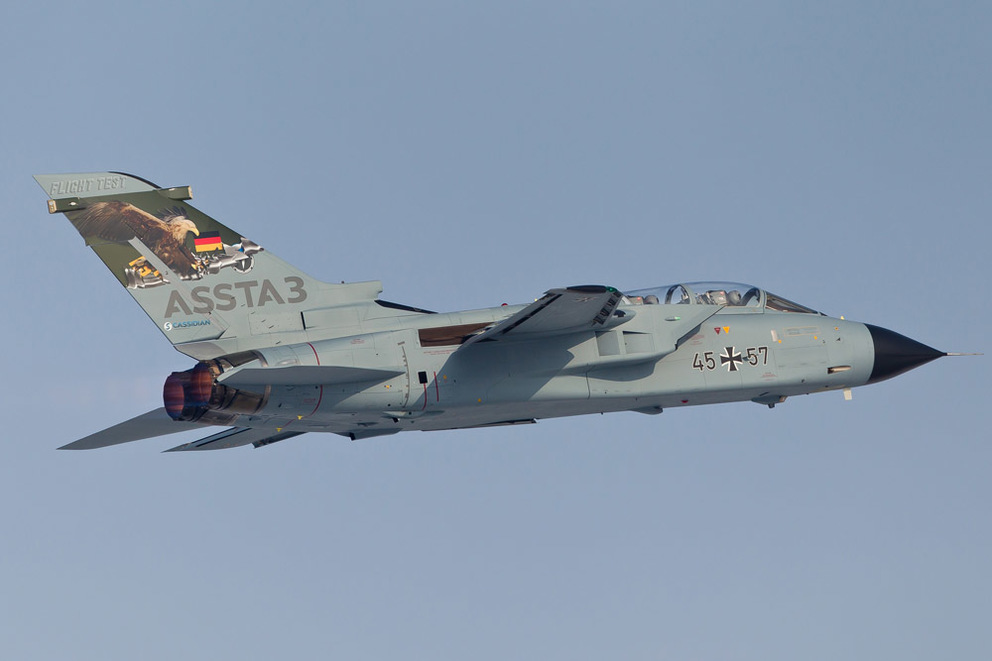




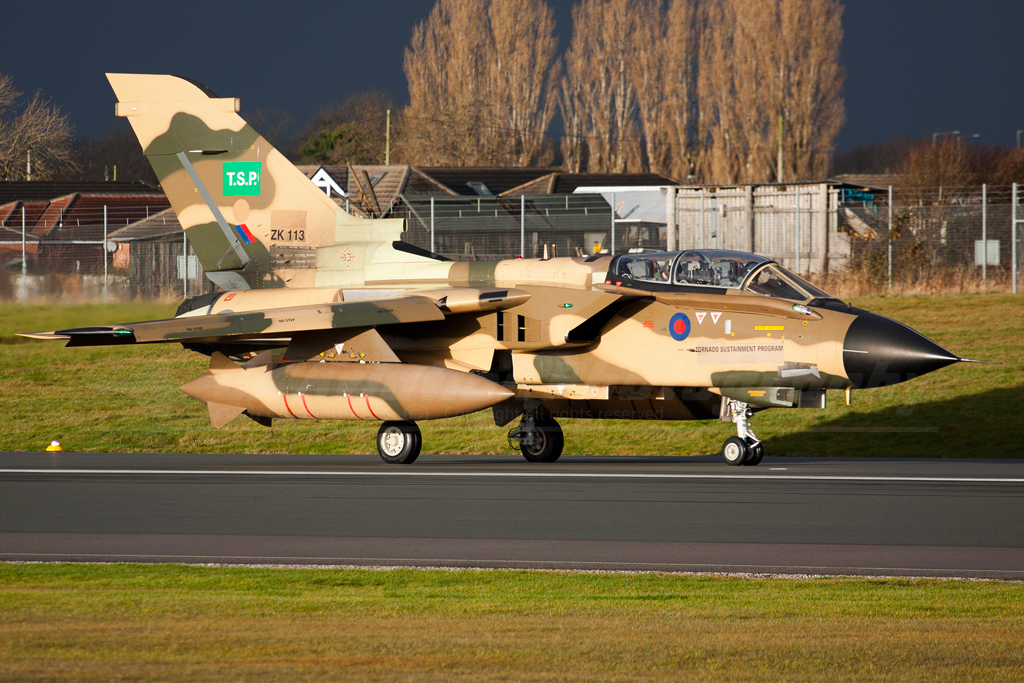
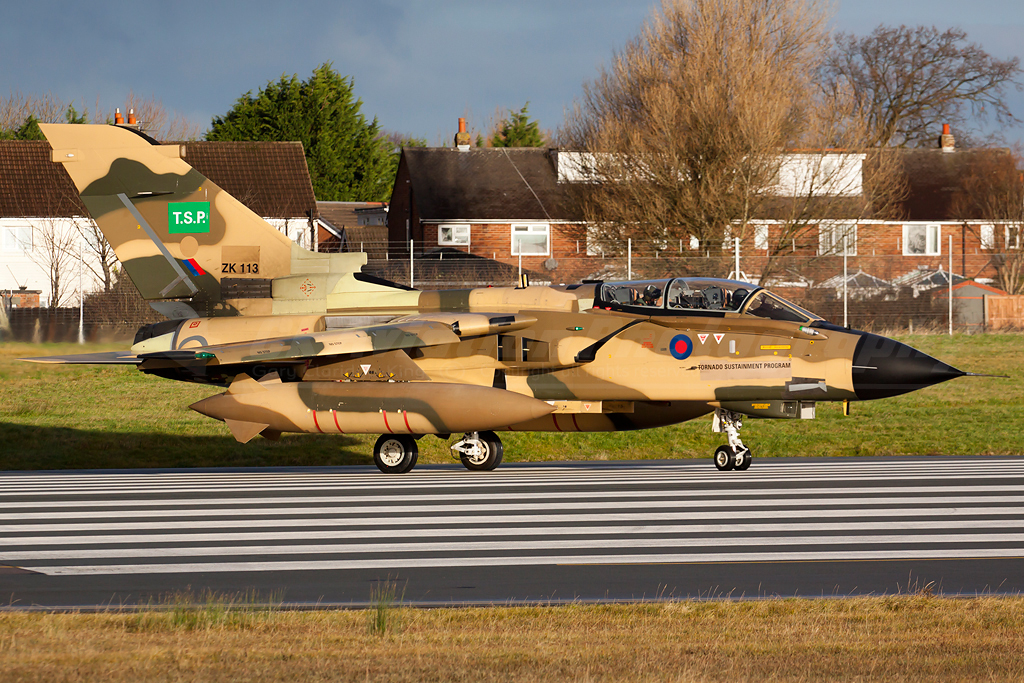

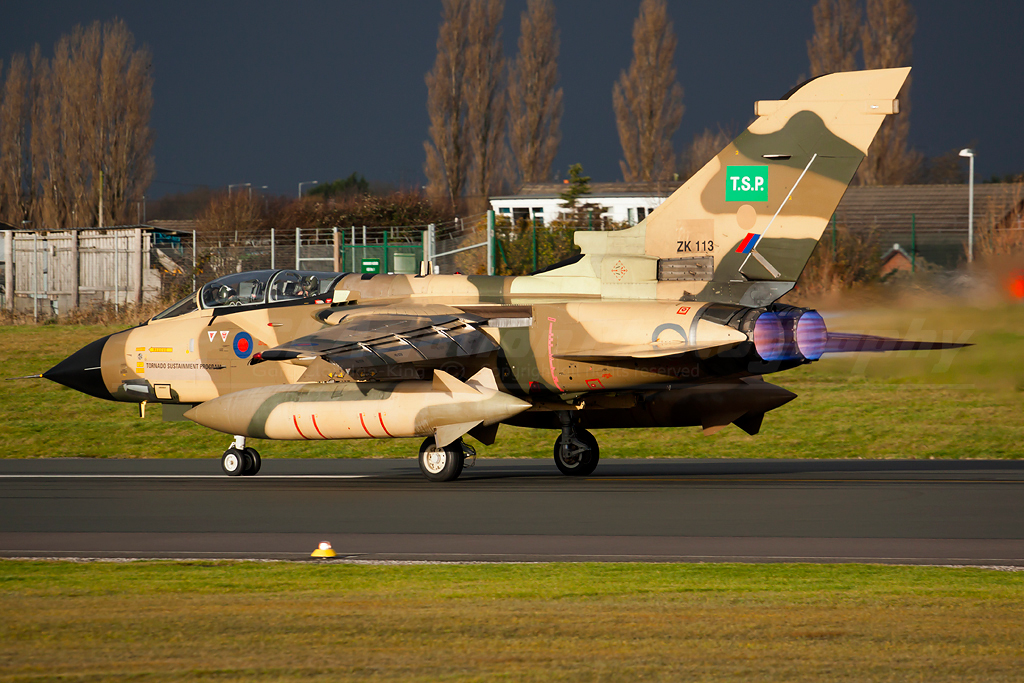
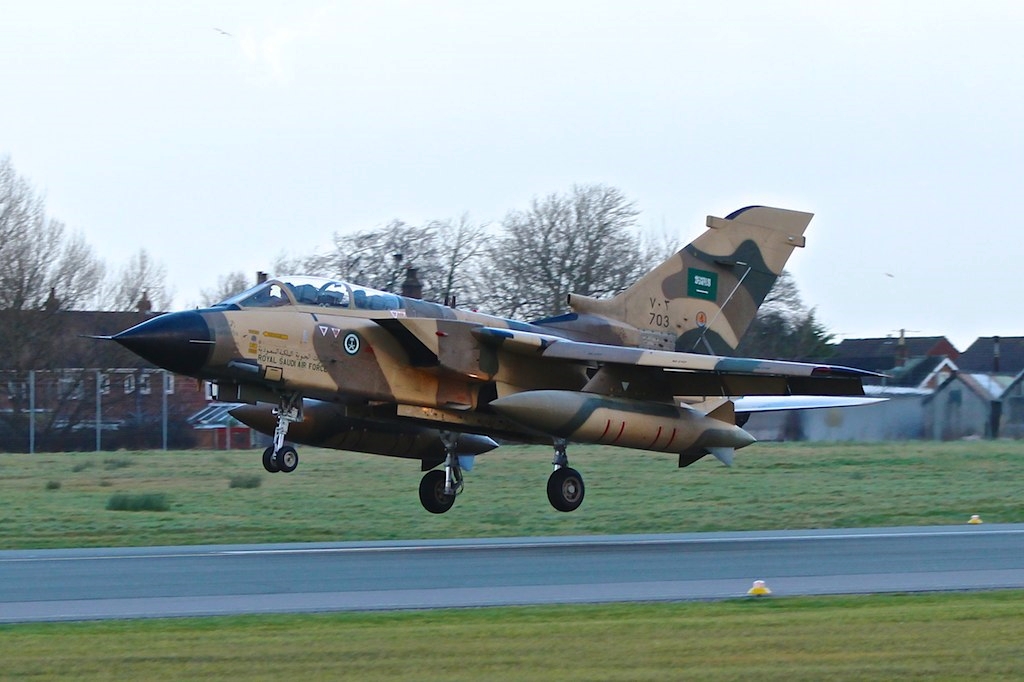

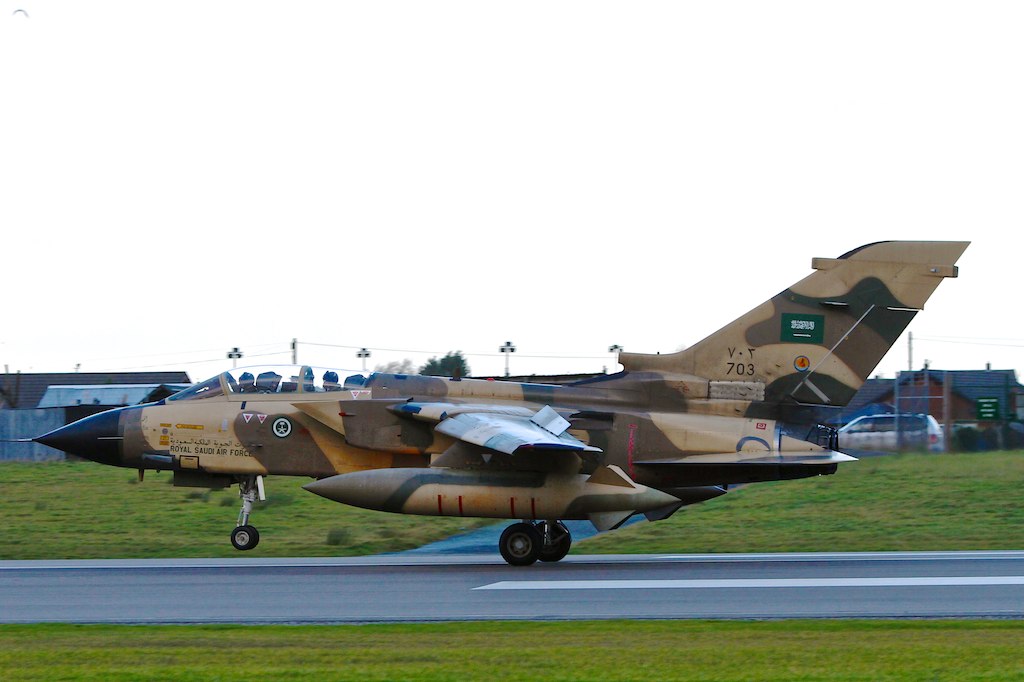



تعليق